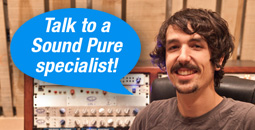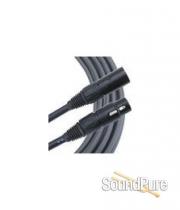The Transient Designer provides a revolutionary concept for dynamic processing rendering controls such as Threshold, Ratio and Gain superfluous. The Transient Designer's automation is highly developed, so that while the processing going on inside the box may be very complex, the user has to deal with just a few intuitive controls.
Differential Envelope Technology
SPL's Differential Envelope Technology is the first analog solution for level-independent shaping of envelopes allowing transients to be accelerated or slowed down and sustain prolonged or shortened. The degree of dynamic processing required to do this couldn't be duplicated even using a chain of several conventional compressors, yet only two controls per channel are required to allow the user to completely reshape the attack and sustain characteristics of a sound. Attack can be amplified or attenuated by up to 15dB while Sustain can be amplified or attenuated by up to 24dB, enabling weak drum sounds to be made much more percussive and powerful, or for over-percussive transients to be softened. All necessary time constants (Attack, Decay and Release) are automated and optimised adaptively in a musical manner according to the characteristics of the input signal. This results in natural sounding signal processing and fast operation.
How does the Transient Designer work?
The Transient Designer uses envelope followers to track the curve of the natural signal so that optimum results are guaranteed regardless of the input signal's dynamics (for more information refer to Tech Talk). Because of the level-independent processing inherent in Differential Envelope Technology (DET?), manual threshold adjustments are not required. In order to maintain the cleanest possible signal path, the Transient Designer uses the excellently specified THAT 2181-VCAs, which are especially natural sounding, transparent and create minimal distortion. High amplitudes are processed without damping of high frequencies or reducing bass.
Sound benefits
The attack of a bass drum or a loop can be emphasised with a single control to increase the punch and the penetration in the mix Sustain of a snare or room-sound can be shortened very musically to clean up the mix for more transparency Acoustic or electronic instruments get "in the face" sounds or can be smoothened with lower attacks De-verb capability! Less Sustain shortens reverb flags of any sound (more elegant than gates do) New panorama effects based on different dynamic effects per channel ? really groovy for loops
Other features and connectivity
For stereo operation the Link function connects channel pairs (1 and 2 and/or 3 and 4). Linked channels are controlled by the same side-chain voltage so as to maintain a coherent and stable stereo image. When operating in Link-mode, the control elements of the first (or third) channel, including the Active switch, control the second (or fourth) channel, too.
Each channel is equipped with a relay hard bypass circuit to ensure a minimum signal path when the process is bypassed and to provide power fail safety. The Signal-LEDs allow to quickly monitor the signal flow, which is particularly important if the four channels are connected to a patchbay. The Transient Designer is fitted with XLR-connectors for balanced operation. To improve signal quality, SPL has developed a new hybrid-component balanced input/output stage using all laser-trimmed resistors with a tolerance of 0.01%. This approach has resulted in an exceptionally high CCMR (common mode rejection) better than -80dB at 1kHz.

























